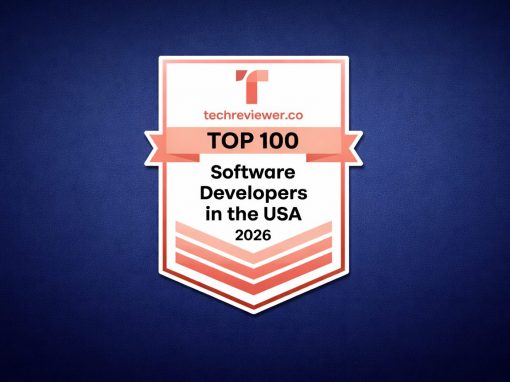Table of Contents
Artificial intelligence (AI) has emerged as a powerful tool in the business landscape, helping businesses streamline operations, mitigate risks, and improve overall customer satisfaction. With solutions tailored for every industry, AI adoption is on the rise, with 72% of businesses using AI in one or more functions and 67% expecting to increase their AI investments over the next three years.
With the global AI market expected to reach $1.85 trillion by 2030, we expect to see more businesses than ever adopting AI technologies. However, AI integration is a complex process, and businesses must know how to align their AI strategy with their unique business goals.
To help businesses navigate the complexities of new technologies, AI strategy consulting has become a crucial asset in ensuring advanced AI business solutions are properly implemented.
Keep reading to learn more about the importance of AI strategy consulting, how to develop an AI strategy, and tips for choosing the right AI strategy consultant.
Understanding AI Strategy: Scope and Key Components
AI strategies are the backbone of successful AI implementation. Keep reading to explore the importance of AI strategies, the four pillars your business should consider, and key components of a comprehensive plan.
Definition and Scope
An AI strategy is a detailed plan for integrating AI into everyday business operations. The goal is to help businesses take full advantage of AI’s capabilities, aligning AI initiatives with business goals for optimal results.
Many underestimate the importance of a well-rounded plan, leading to numerous companies struggling to generate value with AI. In fact, 40% of organizations making significant investments in AI do not report business gains from AI. Though AI opens new opportunities for a range of industries, success lies in the ability to tie your AI strategy to your company’s overall strategy.
There are 4 AI strategy pillars—vision, value, risks, and adoption—that all businesses should consider:
- Vision: Establishing a clear vision for AI within your organization.
- Value: Identifying key areas where AI can enhance business operations.
- Risks: Preparing to assess and mitigate a range of AI risks.
- Adoption: Integrating AI seamlessly into business operations.
Creating an AI strategy is complex, as it must address a range of potential issues, including data flow, communication protocols, data preprocessing, technology infrastructure, model training, and more. It’s important to know that there’s no one-size-fits-all when it comes to creating an AI strategy. Your strategy will depend on your unique requirements, industry regulations, and long-term goals, requiring an in-depth look into your business.
Key Components of a Successful AI Strategy
Key components of an AI strategy include:
- Vision and Goals: The first thing your company needs to do is identify their short- and long-term goals regarding AI implementation. Whether you aim to reduce costs, automate tasks, or improve customer satisfaction. AI initiatives should align with broader business goals to deliver measurable outcomes and support long term artificial intelligence product development.
- Data Strategy: Implementing a strong data strategy ensures that the right data is collected, managed, and utilized, helping you make more informed decisions, obtain information faster, and automate processes. Different strategies will have different outcomes; for instance, using data and AI in sales typically yields faster results, while employing them in product development contributes to long-term goals. A great example of what this can look like is Network Rail’s data-first strategy, which led to significant improvements in performance, time savings, and cost reductions, laying the groundwork for future AI adoption.
- Technology Stack: Choosing the right technology and tools is essential for building, deploying, and maintaining AI models. This typically includes technologies like TensorFlow, Azure AI, PyTorch, and more.
- Talent and Skills: Your team must know how to manage, analyze, and interpret data effectively. Depending on your specific needs, this may include implementing comprehensive training programs or hiring new members to improve the expertise of your team.
“AI adoption fails when businesses chase trends instead of solving real problems. I have worked with companies that poured money into AI expecting instant results, only to abandon projects within months. The most successful implementations start with a specific issue, like reducing customer churn, improving fraud detection, or cutting supply chain delays by weeks, not just broad automation goals.
One company I consulted with used AI-driven analytics to fix inventory shortages, reducing lost sales by 22%. They analyzed past demand spikes, seasonal trends, and external factors like weather to predict stock needs more accurately. The mistake many businesses make is assuming AI will run itself when, in reality, the best results happen when human expertise fine-tunes AI recommendations.“
– Jon Morgan, CEO
What is AI strategy consulting?
AI strategy consulting is a service that helps businesses develop and implement tailored solutions for adopting AI technologies. The goal is to help companies successfully navigate the AI landscape, assisting with key elements such as AI integration, selecting the right technologies and tools for their project, ensuring ethical and compliant AI use, and more. As a result, companies of all sizes can create AI strategies that drive results, therefore improving their ROI.
When to Engage an AI Strategy Consultant
Indicators that your business requires external expertise from an AI strategy consultant include:
- You have an unclear AI strategy: As mentioned, having a clear strategy with defined goals is key to your success. An AI strategy consultant will help you identify opportunities and create a clear roadmap for your team.
- You lack in-house expertise: As companies start implementing custom AI solutions for the first time, they may lack in-house expertise on AI best practices. If that’s the case, you can benefit from partnering with an AI consultant that can help you implement new strategies and train your team.
- You need assistance with risk mitigation: Your AI strategy consultant will help you stay compliant, identify potential risks, manage ethical concerns, and protect against cybersecurity risks.
- You’re new to the world of AI: There are numerous reasons why your company may need to seek the help of an AI consultant. That said, the most common reason is that companies that are newly adopting AI technologies are not aware of the complexities of AI integration. An AI strategy consultant will help you successfully navigate the AI landscape, equipping you with the tools for proper implementation and management.
When it comes to choosing between in-house teams and external AI development companies, companies must consider their unique needs, budget, and long-term goals. For AI strategy consulting, many companies opt for an external partner due to its cost efficiency, allowing them to access specialized skills quickly and only pay for the services they require.

Developing an AI Strategy with a Consultant
There are 4 major steps that you should expect when creating an AI strategy with a consultant: initial assessment, strategy formulation, implementation planning, and change management.
Initial Assessment
During the initial assessment, your AI strategy consultant will work closely with you to better understand your business’ unique goals, challenges, and opportunities. Another key element of this phase is to perform an AI readiness assessment, which involves the evaluation of your organization’s technology, your existing IT infrastructure’s capability to support AI technologies, an analysis of staff skills and knowledge, and how well your AI initiatives align with your business goals. By evaluating your business’ current state and AI readiness, AI consultants can craft a comprehensive strategy that works for you.
Strategy Formulation
Your consultant will then create a detailed plan for AI adoption, defining AI objectives and setting KPIs to track the progress of your strategy. This stage includes choosing the right technology stack for your project, identifying the resources required, and outlining a strategy for implementing it within your company. Since your AI strategy will be tailored to your unique business needs, there are many approaches that your AI consultant may consider, such as leveraging generative AI in the healthcare sector, using AI for web development, creating an AI business assistant, exploring AI use in radiology, or even implementing AI as a legal assistant.
Implementation Planning
This is the phase that turns a well–thought–out plan into actionable steps, involving everything from solution design and system integration to the creation of testing protocols. Your AI deployment roadmap should also include critical information regarding budget, infrastructure, timeline, risk management, and milestones, ensuring everyone involved is clear on what steps need to be taken.
Change Management
Your AI consultant will then prepare your organization for AI adoption by educating and training employees in AI-driven processes to ensure a successful transition. They will also address potential obstacles that your organization may face, including resistance to change, lack of leadership support, and poor project management practices. By carefully preparing your team, you can ensure everyone involved is receptive to change, enabling your organization to fully take advantage of AI capabilities.

Choosing the Right AI Strategy Consulting Partner
Choosing the right AI partner is key to creating and implementing a successful AI strategy. When evaluating the top AI consulting companies, you should consider their technical expertise and industry-specific experience, pricing model, consulting approach, and communication style.
Keep reading to explore how to assess different AI consulting services to choose the right partner for your unique needs.
Technical Expertise and Industry-Specific Experience
When selecting an AI strategy consultancy firm, one of the first things you should evaluate is their technical foundation. You can do this by assessing their expertise in various AI technologies, including machine learning, natural language processing, and computer vision, and ensuring they have advanced integration capabilities. Having extensive experience integrating AI with existing systems, data infrastructures, and workflows within organizations means they can seamlessly align AI solutions with your business needs.
To ensure they can effectively apply these skills to your specific business, you should also evaluate their industry knowledge. By having a deep understanding of your industry, they can better address your industry’s unique challenges and opportunities. We recommend reviewing past case studies to get a better idea of the types of businesses they work with.
Pricing & Added Values
You should carefully evaluate the pricing and value proposition of various firms and compare them with your organization’s specific needs and budget. Aside from the initial price, your company must also consider the long-term value and ROI of AI consulting services, including potential cost savings and revenue generation. You should also consider what’s included in their pricing, such as quality assurance, ongoing support, and other essential services.
Consulting Approach
When choosing a consulting firm, look for a partner whose approach to AI integration solutions and overall methodology aligns with your business’ expectations. It’s highly recommended to choose a partner that provides tailored solutions, as one-size-fits-all approaches limit the success of AI integration strategies. The best consultants will customize their strategies based on your specific business context, challenges, and goals.
You should also consider their collaborative process, ensuring the AI consultant values collaboration with your internal teams. A good consultant will focus on empowering your team by transferring knowledge and ensuring your internal teams can manage AI initiatives post-consultancy.
Communication & Project Collaborations
Open communication and transparent processes foster trust and enhance collaboration, making it a critical factor when selecting a firm. This is especially true for AI consulting, as many businesses are exploring AI for the first time and require clear communication to feel more confident in new AI-driven processes. In addition to evaluating their communication style and methods of collaboration, you should also assess the consultancy’s willingness to work closely with your internal team and adapt to your organization’s culture and specific needs.
Conclusion
AI strategy consultants play a critical role in helping businesses identify new opportunities, successfully implement AI technologies, and stay ahead of emerging trends.
At Scopic, we leverage advanced AI technologies to provide clients with tailored solutions that drive innovation. With our artificial intelligence development services, we’ll implement AI solutions, including deep learning, generative AI software development, and more, to help you unlock limitless possibilities.
To learn more about our generative AI development services, contact us today for a free quote.
FAQs
What can I expect from the AI strategy consulting process?
When you choose Scopic as your AI strategy consultant, we’ll help you identify opportunities for AI implementation, design and develop an AI strategy based on your unique goals and industry requirements, and integrate AI into your existing systems. We’ll support you throughout every stage of the process, ensuring AI technologies align with your long-term business goals.
How long does it typically take to develop an AI strategy?
The timeline for developing and implementing an AI strategy depends on the complexity and scope of the AI initiative. Small projects may only take a couple of months, while large-scale projects can take a year or more. To better understand the timeline for your unique project, contact us for a free quote.
How does an AI strategy consultant differ from a general business consultant?
An AI strategy consultant specializes in leveraging artificial intelligence to solve specific business challenges, focusing on the implementation and integration of AI technologies. General business consultants, on the other hand, provide broader advice on overall business strategy, operations, and management without necessarily having deep expertise in AI or other specialized technologies.
What are the key benefits of hiring an AI strategy consultant?
AI strategy consultants create tailored strategies that help you better align AI technologies with your business’ long-term goals. Working with an AI consultant will help you improve efficiency, start and launch your project faster, and train your team to ensure successful implementation.
How should I evaluate an AI consulting firm’s track record?
You should evaluate your potential partner’s previous case studies to better understand what industries they’ve worked with, what tools and solutions they implement, and how they’ve helped their clients reach their unique goals.
What are the potential risks of implementing AI, and how can an AI strategy consultant help mitigate them?
There are various risks associated with AI implementation, including data privacy concerns, ethical issues, and the possibility of biased or inaccurate outcomes. An AI strategy consultant can help mitigate these risks by ensuring robust data governance, implementing ethical AI practices, and developing models that are transparent and fair.
LLM Fine-Tuning Whitepaper
Implement Smarter LLMs Without Breaking the Bank: A Practical Guide to Fine-Tuning and LoRA

About AI Strategy Consulting Guide
This guide was authored by Baily Ramsey, and reviewed by Enedia Oshafi, Director of Business Development at Scopic.
Scopic provides quality and informative content, powered by our deep-rooted expertise in software development. Our team of content writers and experts have great knowledge in the latest software technologies, allowing them to break down even the most complex topics in the field. They also know how to tackle topics from a wide range of industries, capture their essence, and deliver valuable content across all digital platforms.
Note: This blog’s images are sourced from Freepik.





